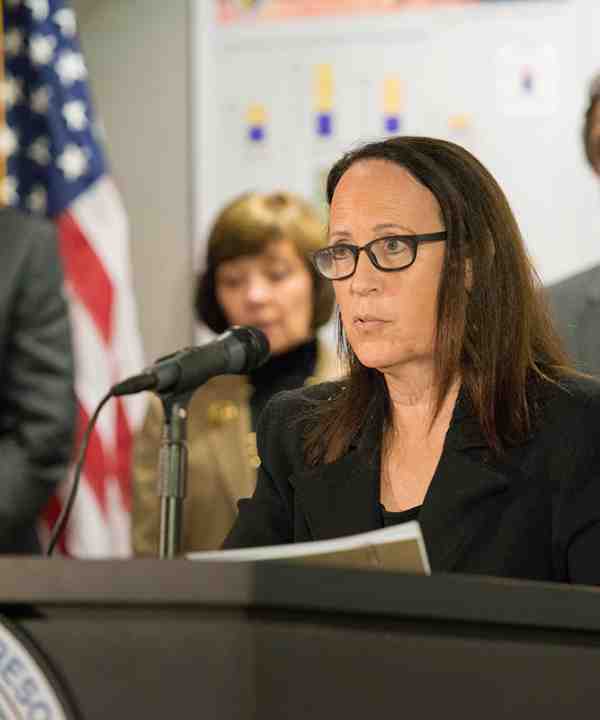August 03, 2020 | Water in the West | News
The Program on Water in the West (WitW) at Stanford University is pleased to announce that Felicia Marcus, a preeminent water policy expert and the previous chair of the California State Water Resources Control Board, is joining the program as this year’s William C. Landreth Visiting Fellow. Deemed "California's Water Czar” by The New York Times for her leadership role during the state’s historic drought, Marcus offers over 35 years of water expertise in organizational management, policy development, program implementation and public engagement at the federal, state and local level.
“We are extremely excited that Felicia will be joining us as the Landreth Visiting Fellow,” said Barton “Buzz” Thompson, faculty director of WitW and the Paradise Professor of Natural Resources Law at Stanford. “Felicia has an established reputation for identifying innovative solutions to seemingly intractable water challenges and then successfully building support for those solutions. While at Stanford, Felicia will continue the critical work that she began while in state, federal and local governments, as well as major NGOs.”
Marcus currently serves as an Obama Administration appointee to the Commission on Environmental Cooperation-Joint Public Advisory Council, a tri-national body focused on providing research, tools and training for decision-makers and the public to engage on environmental policy issues affecting North America. She is also a founding member of the Water Policy Group, a network of current and former national and international water policy officials created to counsel government officials on water policy strategies.
As the former State Water Board chair, Marcus oversaw the state’s regulatory responsibility for water conservation, groundwater management, wastewater recycling, desalination, water rights laws and the state’s drinking water program. During her term she focused on multiple issues, such as better serving disadvantaged communities; developing and implementing historic groundwater management legislation; upgrading and implementing the state’s water rights system; and setting flow and water quality objectives for the San Francisco Bay and Delta. During this time, she also worked to accelerate the adoption of conservation, recycling and stormwater capture through permitting and financial assistance and dealt with a myriad of critical issues to prepare the state for a more challenging water future under climate change.
Prior to that, Marcus served as regional administrator for the Environmental Protection Agency’s Pacific Southwest region during the Clinton Administration, and as president of the Board of Public Works for the City of Los Angeles during the Bradley Administration. Marcus also has a background in the non-profit sector, serving as western director of the Natural Resources Defense Council and executive vice president and chief operating officer of the Trust for Public Land. As a public interest lawyer, as well as a community organizer, she also worked to clean up Santa Monica Bay, most notably as a founder and general counsel to Heal the Bay.
The fellowship provides an opportunity for WitW to engage and host experts working to help solve some of the American West’s greatest water challenges, through research, outreach and teaching. Past fellows include Anne Castle, former assistant secretary for water and science at the U.S. Department of the Interior; Margaret Bowman, former deputy director of the environment program at the Walton Family Foundation; Letty Belin, former counselor to the deputy secretary of the U.S. Department of the Interior; and Timothy Quinn, former executive director of the Association of California Water Agencies.
“I’m beyond honored to be able to spend time considering and advancing the cause of intelligent water management with such an august group of thinkers and doers,” Marcus said. “Stanford has an array of thoughtful and accomplished water and climate experts, who bring intellect and a seriousness of purpose to the water management evolution we need to make to meet the challenges that climate change will increasingly be hurling at us.”
While at Stanford, Marcus plans to focus her efforts on researching policy improvement for water resource management in California and the West, and on convening California water managers and Stanford scientists to examine and advance these improvements. She also aims to promote new connections and research projects that utilize Stanford’s expertise in climate change, legal reform and technological innovation. Marcus will also serve as a guest lecturer, educating and engaging with students on how to address complex water challenges. Her work will include a focus on water’s critical role in climate adaptation and the human dimensions of water policy, while exploring issues such as water rights, ecosystem and watershed protection and the human right to water at local, regional and international levels.
Photo credit: Florence Low / California Department of Water Resources


![[Woods Logo]](/sites/default/files/logos/footer-logo-woods.png)
![[Bill Lane Center Logo]](/sites/default/files/logos/footer-logo-billlane.png)